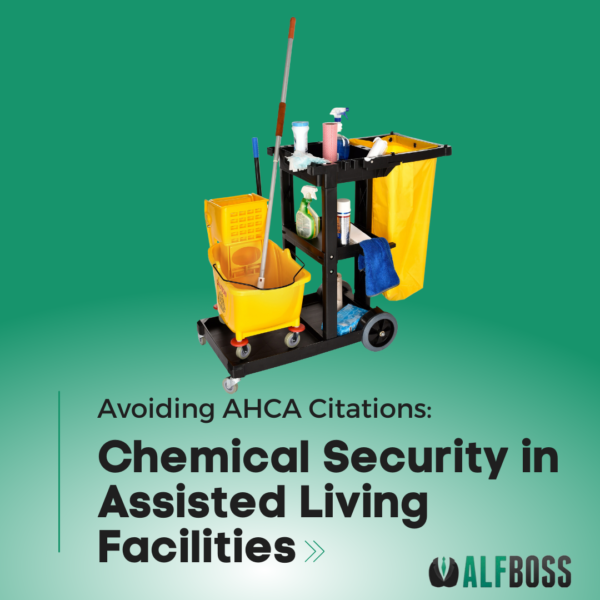
Writen By: Pascal Bergeron
Operating an assisted living facility in Florida comes with the enormous responsibility of ensuring resident safety. One aspect that can’t afford to be overlooked is the proper storage and handling of cleaning supplies and chemicals, particularly in communities where residents suffer from Alzheimer’s and dementia.
A Sobering Reality: Findings from Mock Inspections
During mock inspections, I’ve repeatedly observed serious lapses in safety protocols. Housekeeping carts containing dangerous chemicals are left unattended, and even gasoline canisters have been found accessible to residents.
The Grave Consequences: Deaths and AHCA Penalties
It’s critical to understand that many deaths have occurred due to such negligence. The American Association of Poison Control Centers has reported tens of thousands of poisoning incidents among adults aged 60 and older, some of which have been fatal. This is not just a hypothetical risk but a life-and-death issue.
Furthermore, AHCA surveyors will issue citations for failing to provide a safe living environment and lack of supervision. These citations can result in significant penalties, including hefty fines and even license revocation.
The Risks: Why Immediate Action is Crucial
Given that many residents have Alzheimer’s or dementia, the potential for accidental exposure to hazardous chemicals is not just a compliance issue but a severe health risk.
Actionable Tips: Best Practices for Safety
- Locked Housekeeping Carts: To mitigate risks, invest in locking housekeeping carts and ensure they’re locked whenever not in use.
- Restricted Access: Chemical storage areas should also remain locked at all times.
- Label Clearly: All containers should be adequately marked and preferably color-coded.
- Staff Training: Consistently educate staff on proper chemical handling and the use of personal protective equipment.
- Regular Audits: Conduct frequent inspections to guarantee compliance with all safety protocols.
- Immediate Remediation: If unattended chemicals are found, secure them immediately and retrain staff as necessary.
- Emergency Protocols: Develop an effective emergency response plan tailored for chemical exposure incidents.
Conclusion
The stakes are incredibly high when it comes to the safety of your residents. Following AHCA regulations and guidelines diligently is non-negotiable, not only for compliance but most importantly for the well-being of the people you serve. With lives on the line, securing chemicals and cleaning supplies is an urgent priority every facility must address.